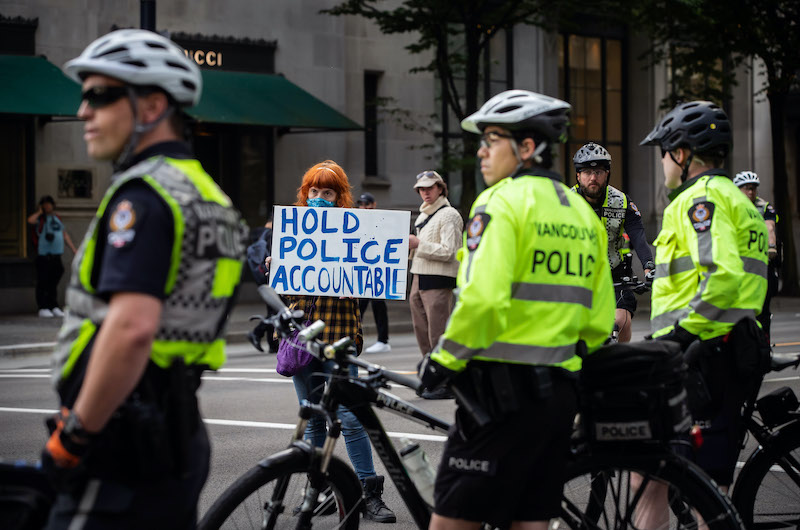Vancouver’s police board has punted a decision on whether to review the practice of street checks down the road, irking advocates who say the checks are illegal and discriminatory.
“In our delegation speech, we talked about no more reviews, no more delays, no more engaging conversation about this discriminatory and illegal practice,” said Latoya Farrell, a lawyer with the BC Civil Liberties Association. “No more reviews and statistics will justify this illegal practice.”
Police board member Rachel Roy had brought forward a motion to review how police conduct street checks. Critics say the checks disproportionately target people of colour, drug users, sex workers and people living in poverty.
A street check is when police stop someone who is not part of a criminal investigation and question them about their activities or ask to see identification. Sometimes the information is entered into a police database.
Roy said it was important for the board to review the practice and consult with the community about how street checks affect them.
But board members voted to refer that motion to its governance committee, with some members saying they felt they should wait for updated statistics from the Vancouver Police Department before moving ahead.
“Community engagement and consultation with the public… is certainly highly important as part of our debate,” said board member Frank Chong.
“I do believe we should consider and look into the statistics and the data as part of the decision-making. My [concern] here is before we even proceed down the path of having any particular consultation with the broader public and the community, we need to have the statistics on hand.”
Roy argued the issue was too urgent to be deferred until February, which is when the VPD will report the updated street check statistics.
“I gave verbal notice of this motion several months ago as I believe this is something urgent that needs to be dealt with,” Roy said.
“We need to have conversations with the community sooner rather than later. The long-lasting impacts that come from street checks that are conducted in a way that creates fear or distrust of the police are there forever.”
Freedom of information requests first reported by the Globe and Mail showed that Black and Indigenous people are heavily over-represented in street checks in Vancouver.
The data showed that in 2016, 21 per cent of all women street-checked were Indigenous, although Indigenous women make up just two per cent of the female population in Vancouver.
Three per cent of men who were street checked were Black, despite accounting for 0.5 per cent of the population; and 12 per cent of the men who were street checked were Indigenous, although they make up just one per cent of Vancouver’s male population.
That data spurred the BC Civil Liberties Association and the Union of BC Indian Chiefs to launch a formal complaint against the Vancouver Police Department and the B.C. government put in place new policing standards stating that street checks must be a “voluntary interaction.”
The VPD reported in January that street checks fell by 90 per cent after the new regulation came into place.
Roy noted that she hasn’t heard concerns from police about “being handcuffed” by those new regulations.
“What I want to see is a formal public discussion about what the new street check policy actually is and how it actually impacts racialized communities,” Roy said.
One former police officer spoke in favour of police continuing the practice of street checks. Dave Dickson was the first officer to compile a list of women missing from the Downtown Eastside in the late 1990s. Speaking to the police board Thursday, Dickson said records of street checks were useful to him as he tried to determine who was truly missing.
But there have been few defenders of the practice as political pressure to end street checks ramped up this spring. Across Canada, attention on racism and police brutality was renewed following the death of George Floyd at the hands of the Minneapolis police.
In July, Mayor Kennedy Stewart introduced a motion to write to the police board to tell the board it was council’s priority “to end the practice of street checks in Vancouver.” That motion passed unanimously.
Council also passed a motion to look at ways the police budget could be redirected away from policing and towards social services in an attempt to “decriminalize” poverty.
At Thursday’s meeting, police board member Barj Dhahan said the board is “not required to follow the priorities, goals and objectives of the council of the municipality.”
But he said the board will meet with council on Oct. 5 “to further enhance the communication on the areas of concern outlined in these two motions.”
While Farrell is frustrated with yet another delay, she said the BCCLA won’t stop fighting for change. And she called on Stewart to show leadership. Stewart is chair of the police board, but cannot vote on motions, and recused himself for Thursday’s discussion.
“To do another review, again, of something that is illegal and should not be happening at all, it just seems disingenuous in terms of addressing systemic racism in policing.” ![]()
Read more: Indigenous, Rights + Justice, Municipal Politics

















Tyee Commenting Guidelines
Comments that violate guidelines risk being deleted, and violations may result in a temporary or permanent user ban. Maintain the spirit of good conversation to stay in the discussion.
*Please note The Tyee is not a forum for spreading misinformation about COVID-19, denying its existence or minimizing its risk to public health.
Do:
Do not: